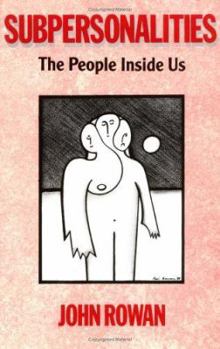Subpersonalities: The People Inside Us
Select Format
Select Condition 
Book Overview
We all have had the experience of being divided, of being in two minds' about something - one part of us wants to do this, another wants to do that. Subpersonalities is the first book to do justice to... This description may be from another edition of this product.
Format:Paperback
Language:English
ISBN:0415043298
ISBN13:9780415043298
Release Date:December 1989
Publisher:Routledge
Length:256 Pages
Weight:0.70 lbs.
Dimensions:0.9" x 5.4" x 8.5"
Customer Reviews
3 ratings
A clear Introduction
Published by Thriftbooks.com User , 16 years ago
This is a very good introduction to the area of subpersonalities including the major contributors, history of the theory beginning with Freud's id, ego, superego, finding your own subs and learning how to work with them toward intergration, or what Jung called Wholeness. Once you see how close other theories are to this, you find ourself asking, why didi't anyone teach me this before--it maks so much sence! Synonyms for subpersonalities include: complexes, archytypes,dream figures, imagoes, disempowered selves, shadows, sub-personalities, ego states, mood states and more. John L author of Reading Thomas Merton
Academic subpersonality
Published by Thriftbooks.com User , 16 years ago
Subpersonalities: The People Inside Us As a management sciences and OR academic, I have been wondering about the ultimate driving forces of decision making in public and private productive organizations. This search led me to study the mind processes. Amongst personality research branches like Jung/MBTI MBTI Manual (A guide to the development and use of the Myers Briggs type indicator) (3rd ed #6111), eneagram Understanding the Enneagram: The Practical Guide to Personality Typesand Big 5 The Big Five Personality Factors, I found this innovative and enlightening book about our inner division. When living in UK last year I was told by John Rowan that there is a new trend to call this subject as "Dialogical Self". Well, I don't agree, because subpersonality reflects the phenomenon in all the extension: it is about our inner autonomous entities, which can take decisions by themselves, without even our knowledge. Despite admiring Herman's book The Dialogical Self in Psychotherapy , I stay with Rowan's subpersonalities. Recently Rita Carter published her Multiplicity Multiplicity: The New Science of Personality, Identity, and the Self, which testifies and spreads the good news. We become one as long as we are aware of our multiplicity. Is there a connection with management sciences? Yes indeed, since we change personalities in order to pretend to keep the apparent coherence. And doing so, we blindly criticize behaviors that correspond to our own conducts. Unconsciously we are afraid of being nothing behind our personalities, what we could only find out if we look at them from inside. What a huge effect over the economic behavior and productive cooperation it could have! This, in short, was the kind of thought that the book arises in the practical reader. With plenty of examples of subpersonality in everyday life, different kinds and origins of subpersonalities, Rowan's book is really insightful and extensively referenced.
Authoritative, clear, readable, and useful
Published by Thriftbooks.com User , 25 years ago
I am a therapist, and have studied Rowan's topic for a decade. He has done an enormous service for lay and clinical people interested in a core phenomenon that affects us all - personality splitting. His book is a credible, well organized, well researched, relatively unbiased survey of what a wide range of mental health researchers have written about splitting in the last 150 years - including Freud, Jung, Fritz Perls, Virginia Satir, and many others. He concludes that - rather than having a single monolithic personality, most (all ?) of us have many "subpersonalities" that activate or slumber, depending on inner and outer circumstances. This confirms my own clinical and personal experience. The idea helps explain why we can "love" someone" and "hate" them at the same time - and diet in the morning, and binge in the evening. The last chapter artfully weaves ideas of several major researchers to postulate an idea of human development that includes the path we each travel toward meaningful spirituality and our "transpersonal," or Higher Self. Rowan's synthesis of earlier theories is the most lucid and credible I've read in over 35 years' research. Rowan is a well read social scientist, psychologist, and an experienced therapist. Anyone seriously interested in understanding theselves - and others - can profit by reading this intriguing book. Another, probably easier to find, is "Internal Family Systems Therapy," by Dr. Richard Schwartz. Based on 19 years' experience, my own book on Rowan's subject focuses on a practical framework for "meeting" and harmonizing normal personality subselves under the expert guidance of the resident true Self: "Who's *Really* Running Your Life? - free your Self, and guard your kids" (xlibris.com, 2nd ed, 2002).






